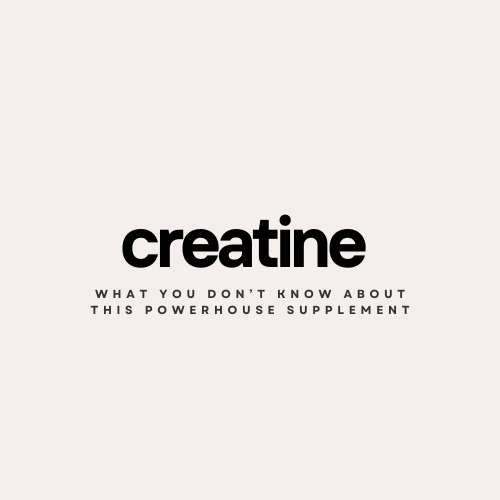Creatine is one of the most researched and effective supplements available, offering a wide range of benefits for both athletic performance and overall health. In this blog, we’ll explore what creatine is, its benefits, how to consume it, and why it’s particularly important for women in perimenopause, menopause, and post-menopause.
What is Creatine?
Creatine is a naturally occurring compound found in muscle cells and the brain. About 95% of the body’s creatine is stored in muscles as phosphocreatine. Chemically, it’s similar to amino acids, the building blocks of proteins.
Does the Body Make Creatine?
Yes, the liver, pancreas, and kidneys naturally produce creatine. However, you can also get it from red meat and seafood. Despite this, many people, especially those following plant-based diets, may benefit from supplementation.
Benefits of Creatine
- Increased Muscle Strength and Size: Creatine supplementation can increase lean muscle mass and improve strength, particularly when combined with resistance training.
- Enhanced Exercise Performance: It can improve high-intensity exercise performance and work capacity.
- Improved Brain Function: Creatine may enhance cognitive performance, especially in situations of sleep deprivation or cognitive decline.
- Bone Health: When combined with resistance training, creatine can have favorable effects on bone health.
- Mood Enhancement: Some studies suggest creatine may have positive effects on mood and cognitive function.
How to Consume Creatine
The most common and well-researched form of creatine is creatine monohydrate. There are two main methods of taking creatine:
- Loading Method: Take 20-25g of creatine daily for 5-7 days, divided into 4-5 servings. Then, maintain with 3-5g daily.
- Low-Dose Daily Method: Simply take 3-5g daily without a loading phase. This method takes about three weeks to reach the same saturation level as the loading method.
Creatine can be taken at any time of day, with or without food. Some research suggests taking it with carbs or protein may increase uptake.
Why Supplement with Creatine?
While our bodies produce creatine, supplementation can significantly increase muscle stores, leading to improved performance and health benefits. This is especially true for vegetarians and vegans, who may have lower natural creatine levels.
Creatine for Perimenopause, Menopause, and Post-Menopause
Creatine supplementation can be particularly beneficial for women during and after menopause:
- Muscle Mass Preservation: Post-menopausal women may experience benefits in skeletal muscle size and function with high-dose creatine supplementation.
- Bone Health: When combined with resistance training, creatine may have favorable effects on bone health, which is crucial during menopause when bone density typically decreases.
- Cognitive Function: Creatine may help maintain cognitive function, which can be affected during menopause.
- Mood Regulation: Some studies suggest creatine may have positive effects on mood, which can be beneficial during the hormonal changes of menopause.
Recommended Creatine Brands
While creatine is a simple, single-ingredient supplement, it’s still important to choose a reputable brand. Here are some trusted options:
- Kion Creatine
- Just Ingredients Creatine
- Cymbiotika Creatine
- Klean and Thorne Creatine (available on Fullscript)
*These brands are known for their quality and third-party testing.
Conclusion
Creatine is a powerful supplement with numerous benefits for women of all ages, particularly those in perimenopause, menopause, and post-menopause. By supporting muscle strength, bone health, cognitive function, and mood, creatine can be a valuable addition to a healthy lifestyle. As always, consult with your healthcare provider before starting any new supplement regimen.
Remember, while supplementation can be beneficial, it’s most effective when combined with a balanced diet and regular exercise. Embrace the power of creatine and take charge of your health and fitness journey!
*Remember, this blog post is for informational purposes only and does not constitute medical advice. The goal is to provide you with researched information to discuss with your healthcare provider as you make informed decisions about your health and wellness journey.
XOXO,
Clarita, Founder of Aligned Rituals

